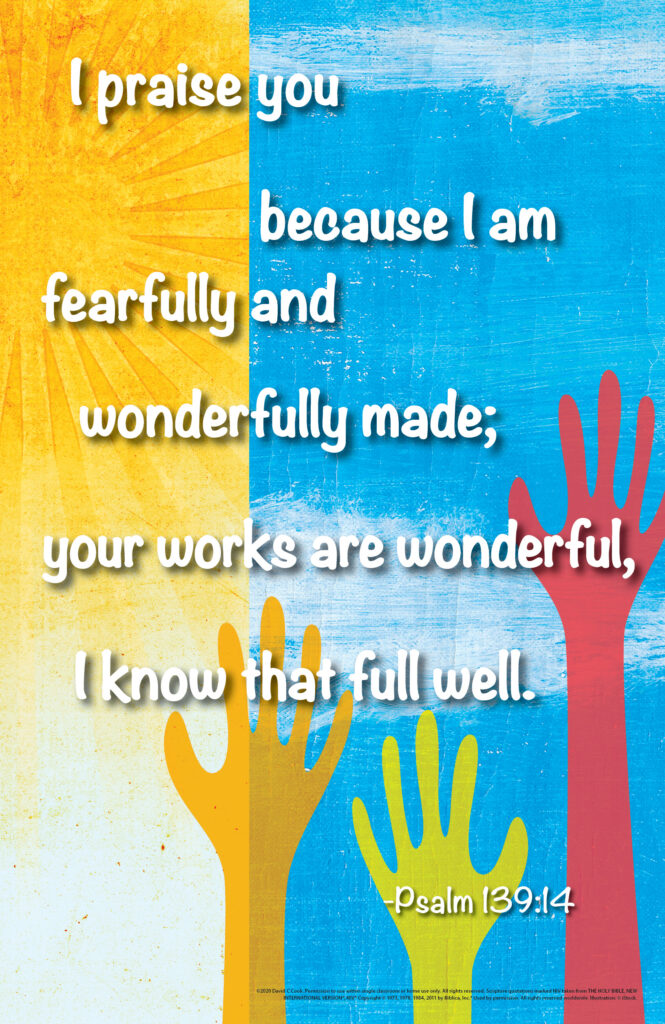During the lesson, the information for you to know is written in regular type, and what we suggest speaking or reading aloud to children is in bold. All resources for this lesson, including the Teacher Guide, Student Page, Family Connection Card, and other resources can be downloaded in a ZIP file by clicking on the following link:
In some lessons you will find "resource articles." These are articles written by experts from around the world to help equip you for your work with children and adolescents. Share them with parents or guardians if you consider it appropriate.
Consider the blameless, observe the upright; a future awaits those who seek peace.
Psalm 37:37
You can feel the anger boiling up inside. You should not have said those things. You should not have been so unkind … or so selfish … or so angry. You should not have done those things you knew were wrong. Now the emotions that drove you to make a poor choice are heating up inside of you.
Even those who love the Lord let anger overheat at times. Whether we are explosive or passive in our anger, it is important to address the cause of our anger. Often anger is a reaction to other deep emotions such as fear, pain, or loneliness. What is at the heart of your anger? Ask God to show you what has sparked it. If a sin sparked your anger, repent and ask Him to wash you clean. If it is another strong emotion, take it to the Prince of Peace. He can dampen the flames of anger in your heart.
As you prepare to teach this lesson, be aware that many of your students may also respond in anger due to other deep emotions they do not know how to deal with—including anger with themselves. Today you can show them how to release their anger and their hearts to God.
Encourage the students to ask their family members, “Have you ever been angry with yourself? How did you resolve your anger?” The students can then share that God loves and values us and that His forgiveness can cover even our anger with ourselves. Also, if possible, make copies of the Resource Article “Helping Teens Regulate from the Inside Out” to distribute to the families of your students.
Teacher Tip: If possible, email or text the Family Connection Card to the families of your students.
Welcome your students warmly. As they arrive, ask them if they tried any of the anger-management techniques they learned last week. Encourage those who share, and commit to praying for them. Begin class with this review:
Last time we were together, we talked about anger. We learned that anger can be healthy or unhealthy. We also learned some techniques to help control anger. Let’s play a fun game to show how our anger can affect others.
Divide the students into 2 teams. Have the teams line up at 1 end of your class space, and place the bucket of water between them. Place the 2 empty buckets at the opposite side of the room, 1 across from each team. Give a cup or bowl to the student at the front of each line. Instruct the students to fill their cups to the top with water. When you say, “Go,” they will run to dump the water into their team’s bucket. Then they will race back to give the cup to the next students in line. The students will continue until every team member has had a turn. (If you have an uneven number of students, let a student on the smaller team take 2 turns.) When the game is over, check the buckets. The team with the most water in its bucket wins.
Look around at the water that was spilled as you tried to fill your buckets. When we are filled with anger, it can be like a cup filled with water. When we are filled with anger, it takes only a small shake or bump to cause the anger to splash onto others. When we have less anger, it does not spill out as easily, and we can control it better.
Divide the students into 3 groups, and give each group 1 of the following scenarios to discuss. If any of these situations do not fit your teens, feel free to come up with a situation that does.
Situation 1: You live at home with your family. Because there are 4 children, there is never enough money to pay your school fees. Your parents cannot afford to send you to school because you are the youngest. What makes you angry? Who are you angry with?
Situation 2: Your parents died in an ethnic conflict. Now you live with your grandmother, who is old and needs you to care for her. Sometimes you are impatient with her because it is hard to have so much work to do. What makes you angry? Who are you angry with?
Situation 3: Your father and mother argue violently all the time. When you try to stop them, they begin yelling at you. What makes you angry? Who are you angry with?
After the students have had 3–4 minutes to discuss their thoughts, give each group 1 minute to share their thoughts with the class. After each group shares, ask the following questions.
When we talked about anger last time, we talked about anger that is directed at those who hurt other people or those who hurt us. But there is another kind of anger that can fill up our lives too. It is anger toward ourselves. Let’s talk about how this kind of anger affects us and what we can do about it.
Many things can make us angry with ourselves—even things that are not our fault. For example, if you were abused, of course you would be angry with the person who abused you. You might also be angry with people who did not, or could not, come to your aid. But you might also experience another type of anger—anger toward yourself.
You might be angry with yourself because you could not fight off the abuser. You might be angry with yourself because you were in a vulnerable situation from which you could not escape. Remember, victims of abuse are never to blame for their situations. But being angry with yourself can be a very real and strong emotion, even for those who are victims. If you were abused, you are not to blame. So being angry with yourself is unhealthy.
There are some healthy reasons to be angry with ourselves. For example, we may make poor choices that we know will hurt us or others. We may say or do something that we know is wrong. We might be angry with ourselves for these choices. That kind of anger is reasonable, if we learn and grow from the mistakes we have made.
Another reason we might have anger toward ourselves is because we have been repeatedly neglected, attacked, or rejected by those who should care for us. Inner rage may build because we begin to think this kind of treatment is what we deserve. We believe what others tell us: that we are the problem or that we are worthless. This can cause us to become angry with ourselves to help us cope with our deep, inner pain.
Even if anger toward ourselves is reasonable, it is not healthy to hold on to that anger. As we talked about in our last lesson, any anger that we hold inside can cause health problems, depression, guilt, and anxiety. It can keep us from doing the things we need and want to do. It is like a cup that is filled to the very top with water. It does not take much to cause it to spill into other areas of our lives or onto other people. That is why we need to find ways to release our anger toward ourselves.
Breathe slowly, move away, communicate with others and especially with God
But there is another important thing to consider when we are angry with ourselves. We need to learn to forgive ourselves for our failings and love ourselves for who we are. We need to believe we are who God says we are!
Teacher Tip: Anger we feel toward ourselves can also lead to self-destructive behavior, such as taking drugs or drinking. Often teens who are angry with themselves struggle and do not feel worthy of being loved. These students may be difficult to reach because they may be experiencing deep pain. Be sure to remind them how much you and God care for them!
I praise you because I am fearfully and wonderfully made; your works are wonderful, I know that full well. I praise you, for I am fearfully and wonderfully made. Wonderful are your works; my soul knows it very well.
Psalm 139:14

God made us. He knows our worth because He only makes wonderful things.
Teacher Tip: This is a helpful verse for students to memorize, as it can bring them comfort when they are struggling with self-worth issues. If time allows, repeat the verse together as a class 3–4 times, so they will remember it in difficult times.
God cares for us when we are afraid or hurt or rejected or angry. He wants us to know that we are fearfully and wonderfully made! He places great value on us. He does not want us to hate ourselves or be angry with ourselves because of things we have done or things that have been done to us. When God looks at us, He sees us through eyes of love.
Ask a student to read Luke 12:6–7 aloud from the Bible. Show The Action Bible image if possible.

Are not five sparrows sold for two pennies? Yet not one of them is forgotten by God. Indeed, the very hairs of your head are all numbered. Don’t be afraid; you are worth more than many sparrows.
Luke 12:6–7
God does not forget anything He has created—not even the common sparrow. He cares for us even more!
He would want us to love ourselves the way He loves us.
Listen to how God cares for you in these verses from Ephesians.
Ask a student to read Ephesians 2:4–5 aloud from the Bible.
But because of his great love for us, God, who is rich in mercy, made us alive with Christ even when we were dead in transgressions— it is by grace you have been saved. .
Ephesians 2:4–5
God loved us even when we were dead in our sins. Because He cares so much for us, we can share our hurt and our anger with Him. When we talked about forgiveness, we learned that God will forgive us when we ask—even for the things we have done that may seem unforgivable. So if God loves us and is not angry with us, why should we be angry with ourselves?
Let’s talk again about the situations from the beginning of class.
Ask the students to get back into their groups from the first part of the lesson. Remind them of the scenarios they discussed.
Give the groups 2–3 minutes to discuss their answers. Then give each group 1 minute to share their thoughts with the class.
Now let’s think about the things that may be causing us to be angry with ourselves.
Have the bucket of water and 1 cup from the first part of the lesson. Pick up the cup and fill it to the top with water. Hold it so everyone in the class can see it.
Anger toward ourselves is harmful to our health and happiness, and it can be hurtful to those around us. As we discussed earlier, being filled with anger is like a cup filled to the top with water. When I move this way or take a step that way, the water spills onto me and onto others.
Demonstrate by moving the cup so the water spills over.
Now think of a real situation when you were angry with yourself, even overflowing with anger toward yourself. Maybe you were disappointed with yourself because you made a bad choice that had negative consequences for you or someone else. Maybe you were mistreated by someone and think you should have prevented the situation. Maybe you were careless and made a mistake that hurt you or someone else. Maybe you used anger to cover up the fear, humiliation, or rejection you felt. No matter why you are angry with yourself, God wants you to give your anger to Him. He wants to help you to get rid of it. He wants you to know that His love and His forgiveness can heal your heart from all that is making you angry with yourself. He wants you to see yourself the way He sees you.
Optional: If you are using the Student Pages, the teens can use the pages to respond.

As you think about your anger, you can ask for God’s help. He can help you deal with your anger in a healthy way that does not hurt you and others. If you want, you can pray to Him right now and ask for His help. Then come up and pray for God’s help as you pour some water from the cup into the bucket. If you do not want to pray, come up and think about releasing your anger as you pour the water into the bucket.
Allow your teens to pray, reflect, and pour water from the cup, if they want to. Watch the level of water in the cup and be sure to refill it so there is enough water for all the teens who want to pour water into the bucket. Then bless the teens individually by name or as a large group with a blessing based on Ephesians 2:10.
Blessing: May you love yourself and see the worth that God has placed in you. May you be reminded that you are His workmanship, and He has created you for good works. May you seek God’s ways as you begin to see yourself as He sees you.
Lead your students in singing this quarter’s song if possible.
Life on Life ©2020 David C Cook. Reproducible for home or classroom use only. All other uses require written permission from David C Cook [email protected]. All rights reserved.